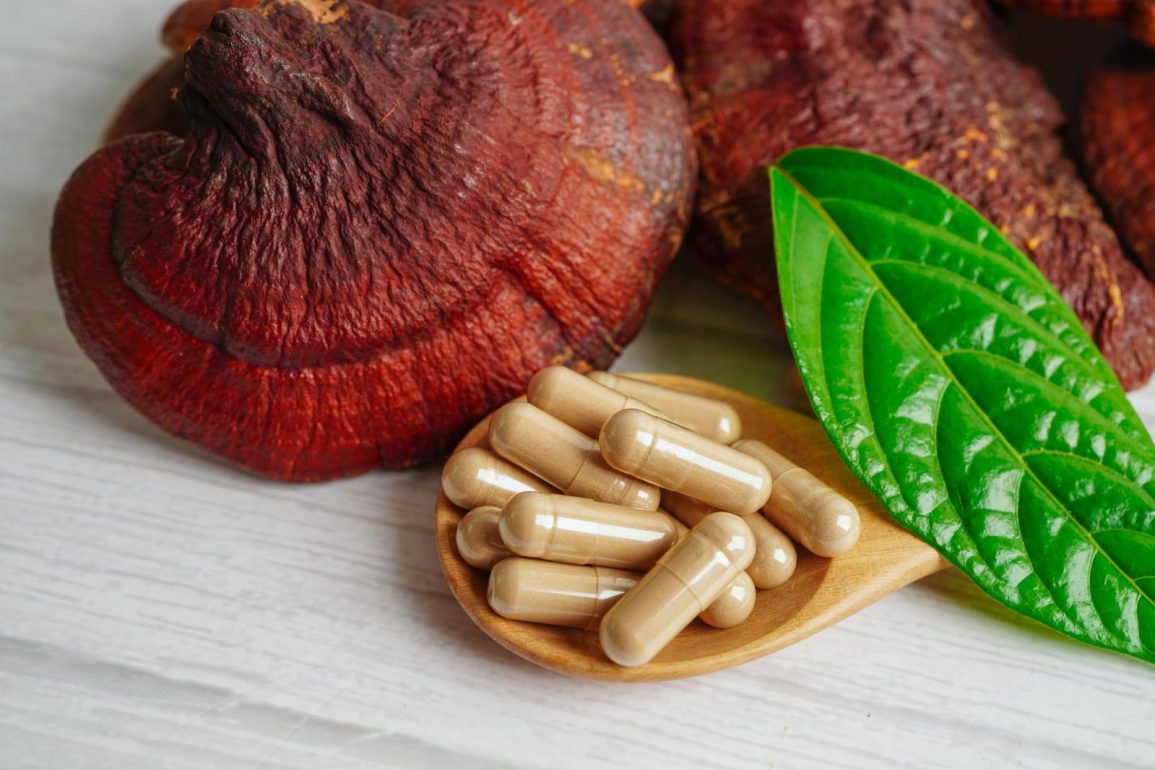In recent years, the popularity of natural and holistic wellness solutions has grown significantly, leading many people to explore alternative forms of supplements and remedies. Among these options, mushroom capsules have gained attention for their potential health benefits. In this article, we’ll delve into what are mushroom capsules and how they differ from traditional herbal medicine.
Table of Contents:
- What Are Mushroom Capsules?
- How To Take Mushroom Capsules?
- What Is the Difference Between Mushroom Capsules and Herbal Medicine?
- What Is the Benefit of Functional Mushrooms and Supplements?
- How Do Mushroom Capsules Benefit the Body?
- Is Mushroom Powder Better than Mushroom Capsules?
- What Are Mushroom Supplements?
- Potential Side Effects of Mushroom Supplements
- Can I Take Mushroom Supplements Every Day?
What Are Mushroom Capsules?
Mushroom capsules, also known as mushroom supplements or mycological supplements, are dietary supplements that contain extracts from various types of mushrooms. These mushrooms often belong to the fungal family known as Basidiomycetes, which includes well-known species like Shiitake (Lentinula edodes), Reishi (Ganoderma lucidum), and Lion’s Mane (Hericium erinaceus).
How To Take Mushroom Capsules?
The process of creating the best mushroom capsules involves extracting bioactive compounds, such as polysaccharides, terpenoids, and beta-glucans, from the mushroom fruiting bodies or mycelium. These compounds are believed to contribute to the potential health benefits of mushrooms.
Mushroom capsules come in various formulations, with each type of mushroom offering its unique set of benefits. Some of the most popular mushroom capsules and their potential advantages include:
- Reishi Mushroom Capsules: Reishi mushrooms are known for their potential immune-boosting properties and their ability to promote relaxation and stress reduction.
- Lion’s Mane Mushroom Capsules: Lion’s Mane is believed to support cognitive function and may have neuroprotective properties. It’s often sought after for its potential benefits for brain health.
- Cordyceps Mushroom Capsules: Cordyceps are associated with increased energy levels, improved endurance, and potential benefits for the respiratory system.
- Shiitake Mushroom Capsules: Shiitake mushrooms are rich in nutrients and may offer support for the immune system, cardiovascular health, and overall vitality.
- Chaga Mushroom Capsules: Chaga is often used for its potential antioxidant and anti-inflammatory properties. It may also support immune function.
What Is the Difference Between Mushroom Capsules and Herbal Medicine?
While both mushroom capsules and mushroom capsules are considered forms of natural remedies, there are some key differences between the two:
1. Source: Herbal medicine typically relies on plant-based ingredients, such as leaves, roots, flowers, and seeds, for its formulations. In contrast, mushroom capsules are derived from mushrooms, which belong to the fungal kingdom.
2. Bioactive Compounds: Both herbal medicine and mushroom capsules contain bioactive compounds that contribute to their potential health benefits. Herbal medicine often emphasizes the use of specific plant compounds, such as alkaloids or flavonoids, while mushroom capsules focus on compounds like polysaccharides and beta-glucans found in mushrooms.
3. Tradition and Culture: Herbal medicine has a long history of use in various cultures worldwide, often based on traditional knowledge and practices. In contrast, the use of mushroom-based remedies is more recent and has gained popularity through modern scientific research.
4. Targeted Benefits: The potential health benefits of herbal medicine vary widely based on the plant used. Mushroom capsules, on the other hand, are often chosen for specific health concerns associated with the type of mushroom, such as immune support, cognitive function, or energy enhancement.
What Is the Benefit of Functional Mushrooms and Supplements?
Functional mushrooms, also known as medicinal mushrooms, are a group of fungi that are revered for their potential health-promoting properties. These mushrooms have been used for centuries in traditional medicine systems, such as Traditional Chinese Medicine (TCM) and Ayurveda, to address various health concerns. Some of the most popular functional mushrooms include Reishi, Lion’s Mane, Cordyceps, Chaga, and Shiitake.
The benefits of functional mushrooms and their supplements are vast and may include:
1. Immune Support: Many functional mushrooms are renowned for their immune-boosting properties. They contain bioactive compounds like beta-glucans that can help modulate the immune system and enhance its response to infections and diseases.
2. Cognitive Enhancement: Lion’s Mane mushroom, in particular, is associated with cognitive benefits. It may support brain health, improve memory, and enhance cognitive function.
3. Adaptogenic Effects: Some functional mushrooms, like Reishi and Cordyceps, have adaptogenic properties. Adaptogens help the body adapt to stress and maintain balance, both mentally and physically.
4. Energy and Endurance: Cordyceps mushrooms are known for their potential to increase energy levels and improve endurance. Athletes often turn to Cordyceps supplements for a natural performance boost.
5. Antioxidant Properties: Many functional mushrooms are rich in antioxidants, which can help combat oxidative stress, reduce inflammation, and protect against chronic diseases.
How Do Mushroom Capsules Benefit the Body?
Mushroom capsules are a convenient and popular way to incorporate functional mushrooms into your daily wellness routine. Here are some of the benefits of using mushroom capsules:
1. Precise Dosage: Mushroom capsules offer a consistent and precise dosage of the mushroom extract. This can be particularly important when you’re targeting specific health concerns or benefits.
2. Convenience: Capsules are easy to take and can be integrated seamlessly into your daily supplement regimen. They don’t require any preparation or measuring, making them a convenient choice for busy lifestyles.
3. Improved Absorption: Some mushroom extracts may be more bioavailable when encapsulated, ensuring that your body can absorb and utilize the beneficial compounds effectively.
4. Reduced Taste and Odor: While some people enjoy the taste of mushroom-based beverages or foods, others may find them less palatable. Capsules provide an odorless and tasteless option for those who prefer a more neutral delivery method.
5. Longer Shelf Life: Mushroom capsules typically have a longer shelf life compared to mushroom powders, which can degrade more rapidly when exposed to air and moisture.
Is Mushroom Powder Better than Mushroom Capsules?
Whether mushroom powder is better than mushroom capsules depends on individual preferences and needs. Both forms have their merits:
Mushroom Powder:
- Versatility: Mushroom powders can be added to a variety of recipes, including smoothies, soups, and baked goods, allowing for culinary creativity.
- Customization: You can adjust the dosage more flexibly when using powder, which can be advantageous if you want to experiment with different quantities.
- Rapid Absorption: Some people prefer mushroom powder because it can be absorbed more quickly when mixed with liquids.
Mushroom Capsules:
- Convenience: Capsules offer a hassle-free way to incorporate functional mushrooms into your routine without the need for preparation.
- Precise Dosage: Capsules provide consistent dosing, ensuring you receive a specific amount of the mushroom extract with each serving.
- Tasteless and Odorless: Capsules are a suitable option for those who dislike the taste or aroma of mushrooms.
What Are Mushroom Supplements?
Mushroom supplements, also known as functional mushroom supplements or mycological supplements, are dietary supplements that contain extracts from various types of mushrooms. These mushrooms often belong to the Basidiomycetes family and include well-known species such as Reishi, Lion’s Mane, Cordyceps, Chaga, and Shiitake. Mushroom supplements are renowned for their potential health benefits, including immune support, cognitive enhancement, and adaptogenic effects.
Potential Side Effects of Mushroom Supplements
While mushroom supplements are generally considered safe for most people, some individuals may experience side effects. It’s important to note that these side effects are typically mild and rare. Common side effects associated with mushroom supplements may include:
1. Gastrointestinal Distress: Some people may experience mild digestive issues such as upset stomach, bloating, or diarrhea after taking mushroom supplements. These symptoms are usually temporary and can often be mitigated by adjusting the dosage or taking the supplements with food.
2. Allergic Reactions: Although rare, allergic reactions to certain mushroom species can occur. Symptoms may include itching, rash, swelling, or difficulty breathing. If you suspect an allergy, discontinue use immediately and seek medical attention.
3. Interaction with Medications: If you are taking medications or have underlying health conditions, it’s essential to consult with a healthcare professional before adding mushroom supplements to your routine. Some mushrooms may interact with medications or exacerbate certain health conditions.
4. Insomnia: In some cases, mushroom supplements that affect cognitive function, such as Lion’s Mane, may lead to insomnia or disrupted sleep patterns if taken too late in the day. It’s advisable to take such supplements earlier in the day to minimize sleep disturbances.
5. Nervousness or Jitters: Cordyceps supplements, known for their potential energy-boosting effects, may lead to feelings of nervousness or jitters in sensitive individuals. Adjusting the dosage or consuming them earlier in the day may help alleviate these symptoms.
Can I Take Mushroom Supplements Every Day?
The question of whether it’s safe to take mushroom supplements daily depends on several factors, including the type of mushroom supplement, your health, and your goals. Here are some considerations:
1. Type of Mushroom: Some mushroom supplements, such as Reishi and Chaga, are considered generally safe for daily use due to their adaptogenic and immune-supporting properties. However, others, like Cordyceps or Lion’s Mane, may be best used periodically or as needed, especially if you experience side effects.
2. Individual Tolerance: Everyone’s body reacts differently to supplements. Some individuals may tolerate daily use of mushroom supplements without any issues, while others may experience side effects or sensitivities. Start with a lower dosage and gradually increase it if needed, paying attention to how your body responds.
3. Health Goals: Consider your health goals when deciding whether to take mushroom supplements daily. If you’re taking them for ongoing immune support or general well-being, daily use may be appropriate. However, if you’re using them for specific short-term benefits, such as increased energy or cognitive enhancement, occasional use may be sufficient.
4. Consultation with a Healthcare Professional: If you have underlying health conditions, are taking medications, or are pregnant or breastfeeding, it’s crucial to consult with a healthcare professional before starting any new dietary supplement regimen. They can provide personalized guidance based on your individual health profile.
In conclusion, mushroom supplements offer a range of potential health benefits, and the side effects are generally mild and infrequent. Whether you can take mushroom supplements every day depends on various factors, including the type of supplement, your individual tolerance, health goals, and consultation with a healthcare professional. Always prioritize safety and pay attention to how your body responds to ensure a positive and effective experience when incorporating mushroom supplements into your daily routine.
Disclaimer – The contents of this article are provided solely for informational purposes and should not be considered medical advice. It is important to note that the information presented here is not meant to diagnose, treat, cure, or prevent any disease. Prior to embarking on any new health-related regimen, Always consult your healthcare provider before trying new supplements or treatments. Keeping you safe and well is our top priority. Additionally, it’s important to note that the FDA has not endorsed any claims regarding the health benefits of cannabis. Delta8Hub makes no guarantees or warranties regarding the accuracy, completeness, or usefulness of any messages contained here in.

